- Home
- Craig Martelle
Become a Successful Indie Author Page 6
Become a Successful Indie Author Read online
Page 6
Organizing your business is about managing risk
There are a plethora of options out there in how to organize your business, and all of them have their own benefits and pitfalls. It depends on how you best want to manage your risk.
I personally have an S Corporation, copyright my works in my own name, and carry an umbrella policy—also called errors and omissions—for insurance coverage. This works the best for me to limit my tax exposure, while providing risk protection.
The chance of an author getting sued is low, but you have to understand that it is a risk. If you are sued and lose, then if you have no corporate organization or other protections, the lawsuit winner can go after your personal belongings like your home or your vehicle. As a lawyer, I can represent myself, I hope competently. Most people would have to hire an attorney and that can get expensive. Know the triggers and avoid them. Here are a few examples of what not to do.
Don’t use Disney characters in your books
Don’t use song lyrics without permission (unless fair use applies, which is usually limited to non-fiction or satire)
Don’t show a corporation in a bad light (an example would be writing a story where Taco Bell causes a listeria outbreak where hundreds of people die)
How do you avoid those miscues? Google. Find a Taco name that isn’t taken. The Taco Place. I just Googled it and there wasn’t a taco joint with that name. You can change names, mix things up. As long as you make an effort to not use real company names, you will be far less likely to end up on the wrong end of administrative law.
SWOT Analysis of Your Business
SWOT stands for strengths, weaknesses, opportunities, and threats. It is a business analysis tool. I’ll do mine so you can have an idea of how I look at my business world.
Strength – significant production, business savvy with a continuous improvement mindset.
Weakness – I admit it, I don’t like marketing and I hate self-promo. I suck so bad when I try to do it that I look like a complete buffoon.
Opportunities – thanks to tools like KDP Rocket, I am comfortable that I’m not only writing in a big market, but that it is still growing for books that resonate. The readers are there, we only need to get a book into their hands.
Threat – there’s no outside threat except losing power or something catastrophic happening to my home in the Alaskan wild. The real threat would come from within, either burnout or illness. I’m not completely healthy, but writing is a great outlet for my energy.
Exploit the strengths, minimize the weaknesses, dig into the opportunities, and mitigate the threats. I have not slowed down, but thanks to outlining, I have greatly increased my production without any additional work. I have set aside time each week to run through my ad campaigns, although I usually cut that in half when the time comes. Nothing sells the last book like the next book. Okay, if I market well, I get both victories.
Keep writing in my market while watching the new players. It appears that space fantasy is taking off. My Mystically Engineered short story is resonating. That may be a new market to explore, but I don’t have the bandwidth to write it right now.
Sphere of Control - Sphere of Influence
From a business perspective, you are in control of a lot, but not everything, not even a fraction of everything. If you’ve ever had a title with a traditional publisher, then you’ll see what real frustration is as you are in control of almost nothing and have to trust that they’ll take of your concerns seriously. My publisher, Permuted Press, has done me right. They are a pleasure to work with and if I have concerns, they address them right away.
If you need to fix a typo in your book, you make the change and upload the new eBook. If you decide you need a new cover, you get a new one and upload it. If you want to change your blurb every single day, you can do that, too.
Changing your blurb – do it out of the KDP bookshelf page (if you’re on Amazon) or through D2D if you’re wide (I personally would not go direct to other retailers because you have the same learning curve for each – who has time for that?). On Amazon, if you do it through your Author Central page, it’s convenient, but if there is a price change or anything like that on your book, it will revert to what you posted through the KDP bookshelf. If you want to dabble, then Author Central works, but if you want to fix things for good, do it through the book’s page from the KDP bookshelf.
If you want more sales, you can control the advertising, but you cannot control the buyers. You have to make your product enticing, and that can be partly done through a good cover or a good blurb.
Representative Business Structure by Joe Solari
No matter what advice you receive, from a lawyer or certified public accountant, it comes with the caveat that every circumstance is different and no responsibility is taken for the outcomes if you follow the advice given. Of course the same goes with this article. I can tell you what I think and what I have done and why I think it makes sense.
Joe lives in Illinois and in this state, this is an option for an author’s business structure.
Set up a subchapter S corporation.
This is a little more complex than starting an LLC but well within the skill set of anyone who is running an indie publishing shop. The benefits are below:
You can pay yourself a salary and issue a W-2.
The power of the W-2:
If you are self-employed, you know the pain of not having a W-2. Anytime you go to buy a car or refinance your house and tell the credit manager that you are self-employed, the options for financing are either diminished or expensive. However, if you are able to provide a W-2, you can easily go through standard loan qualification. With an S Corporation, you will be a shareholder, an officer, and an EMPLOYEE. This is impossible with an LLC. This may not seem like a big deal now, but it will be if you attempt to buy something big and need credit.
Reduce Tax Burden
Here is another benefit that is perfectly legal but only available to Subchapter S Corporations.
Since you can now be a salaried employee, your Medicare, FICA, and state employment taxes apply to the salary you make. You will need to adjust your salary in proportion to the overall revenue of the business. The IRS is aware of the trick where an owner takes a low salary to keep employment taxes down. A good rule of thumb is 50% of the operating profits.
The profits of the corporation would typically require you to pay corporate income tax but since you are subchapter S, profits pass through to you and you pay at your personal income level. That means you save the 3-15% self-employment tax that you would pay if you had an LLC!
With a bank account, EIN, and articles of incorporation, you now have all the necessary pieces for operating your publishing business. The first thing to do is switch your KDP and other accounts that provide income to the business to use the business EIN, and then set the funds to go to your business bank account.
Managing Your Taxes
A good rule of thumb is to set aside 30% of your profit for taxes. A better rule is to set aside 40%.
Make your quarterly estimated tax payments (in the U.S.) and note that they aren’t normal quarters. Look to make your payments before these dates.
April 15
June 15
September 15
January 15
S Corp or individuals should use Form 1040es through the IRS EFTPS portal. LLC & C Corporations will use the Form 941, which is for payroll taxes, unless your LLC uses flow-through taxation.
That stuff makes my brain hurt. Consult a tax professional to get it right, but you have to get it mostly right. If you make money but don’t pay quarterly taxes, the IRS could hit you with a penalty. You don’t want to give the tax man any more money than you have to.
With the new tax laws (effective for 2018 in the United States), we don’t have fidelity yet on what we can and can’t deduct, so that will have to be a later supplement. No matter what, keep good records with receipts for every penny you spend. If you can deduc
t it, then you will need the receipt. If you can’t? Well, better safe than sorry.
And the bottom line is to deduct your expenses, you need to make a profit. You can’t keep deducting if your business isn’t making money. That’s one of the main reasons most businesses go out of business in their fourth year, because the old IRS rules required a business to make a profit two years out of five in order to be something more than a hobby. As a hobby, you get taxed on the revenue without the commensurate deduction for expenses. Cool? Not quite. Make a profit. I gave myself one year to get into the black. I did in my eleventh month of self-publishing, although I had a negative carry-over to the second year.
The second year, I made plenty to cover that and add significantly to Uncle Sam’s coffers. As I tell those who make it in this business, the IRS thanks you for your success. My dad (an enrolled agent with the IRS) always says that if you pay taxes, that means you made money. No tax rate is 100%, and it’s not even 50%, so you get to keep most of it. It would be nice to keep all of it, but we don’t live in that world. We get to share. Be happy that you have something to share, even if you don’t like how that share is spent.
In the fatalist words of the worst meme you hear, “It is what it is.”
Taxes
With the new tax law in the U.S. and the complexities of international taxes, no person’s situation is identical to anyone else’s.
The best thing I can tell you is to keep great records. You should (keyword is should because we have been able to in the past) be able to deduct your expenses as an author without having to go the depreciation route. For example, a farmer buys a tractor which retains value over a number of years so the farmer cannot deduct the full cost of the tractor in the purchase year.
I deduct my travel because I write every day, no matter where I am. I also put scenes from those places into my books. It’s research. It’s a writing retreat. I deduct the airline ticket, taxi, rental car, hotel, and use a per diem for my meals. I also deduct any conference fees, which is one of the reasons I travel.
At home, I do not take a home office deduction. I don’t want to lose the tax deduction should we sell our home or get a visit from any federal agency to verify that my office is up to code. It is, but I refuse to allow a warrantless search of my home. That’s a lawyer thing for me. I deduct two phones and a mifi that I bought for the business. I get a bill that is nice and clean and stuff it into a file each and every month. I also deduct any software that I buy like Grammarly and any membership fees, like $100 a year for NINC (Novelists Inc). When I get a new computer or add-on, I deduct that because I use my computer for work. Work is all I do. I don’t have any games loaded or anything like that.
I pay people, so I deduct the costs for my editor, my assistant, and joint royalties from collaborations or anthologies. Let me talk about the 1099-MISC. We are supposed to issue one of those to anyone to whom we’ve paid more than $600. Unless it’s royalties, and then the threshold is only $10 (https://www.irs.gov/instructions/i1099msc). But wait, if you pay through an electronic service like PayPal or with a credit card, you don’t have to issue a 1099-MISC as there’s a record.
But there is a huge gray area. PayPal doesn’t issue a 1099-K, which is a report of transfers that they share with the IRS, unless the individual has received over $20,000 AND has made over 200 transactions. Somewhere between $10 and $20,000 is what you’ve sent and you want to deduct it. My father is an enrolled agent with the IRS and he said that people only get in trouble if they don’t issue a 1099 when they should, not if they send one when they don’t have to.
So, if you pay royalties by paper check to anyone (and I have because of some old-school authors), then you need to send those individuals a 1099-MISC.
I also send one to my assistant and my editor as they are both working for me as sub-contractors. There is no duplicate reporting. PayPal’s 1099-K doesn’t take the place of a 1099-MISC. The person won’t be double-taxed. Once is quite enough. I have an accountant who generates these for me along with the 1096, which is the form that you have to send to the IRS to inform them that you’ve issued 1099-MISCs. How do you get the information you need to fill out a 1099-MISC? Why, that’s from a form W-9. Keep them on file, but keep them secure, as you’ll have the person’s social security number and you can get in a lot of trouble for releasing any of that information to the public.
And none of that applies to non-US Citizens who live and work outside the United States. Be free! And don’t forget to pay your taxes to your home country.
What else do I deduct? Advertising. I deduct a lot of advertising. Keep good records. Some people use software like “Wave” that interfaces with your bank account to detail your costs. I use a spreadsheet and a lot of folders because I print everything. If I get audited, I have a mountain of paperwork that I will bring with me, all sorted into its own folders and spreadsheets that I have backed up, just in case. Redundant records are happy records.
I buy some of my own paperbacks to have on hand and use as giveaways. This is product and the key is to make sure that you don’t have any on hand come the new year, otherwise you get to pay taxes on it as if you sold it at full retail.
I buy a lot of gifts for people who help me. I deduct them under a client recognition category. I buy dinners for people. Get the receipt and list everyone who was present. Last year’s rules allowed a 50% deduction for those costs. It’s worth it.
Copyright & Keeping Your Books Safe
The term of copyright for a particular work depends on several factors, including whether it has been published, and, if so, the date of first publication. As a general rule, for works created after January 1, 1978, copyright protection lasts for the life of the author plus an additional 70 years. For an anonymous work, a pseudonymous work, or a work made for hire, the copyright endures for a term of 95 years from the year of its first publication or a term of 120 years from the year of its creation, whichever expires first. For works first published prior to 1978, the term will vary depending on several factors. To determine the length of copyright protection for a particular work, consult chapter 3 of the Copyright Act (title 17 of the United States Code).
Unscrupulous souls will download your book and steal it. It is a fact of life. Most sites that offer “free” books that have been illegally obtained are filled with malware and viruses. But some come across as legitimate. Hands down, the best service to use is Blasty. (https:// blasty.co/). You register your books and they issue the takedown notices. Easy as pie. The free version is more time-consuming, but it’ll save you a lot of grief and worry. Blasty will issue the takedown notices for you so whenever anyone does an honest Google search for your books, they’ll only find your legitimate outlets.
The following is straight from the U.S. Patent and Trademark Office:
How can I secure a copyright?
This is a frequently misunderstood topic because many people believe that you must register your work before you can claim copyright. However, no publication, registration or other action in the Copyright Office is required to secure copyright. Copyright is secured automatically when the work is created, and a work is "created" when it is fixed in a "copy or a phonorecord for the first time." For example, a song can be fixed in sheet music or on a CD, or both. Although registration with the Copyright Office is not required to secure protection, it is highly recommended for the following reasons:
Registration establishes a public record of the copyright claim.
Registration is necessary before an infringement suit may be filed in court (for works of U. S. origin).
If made before or within 5 years of publication, registration establishes prima facie evidence in court of the validity of the copyright and of the facts stated in the certificate.
If registration is made within 3 months after publication of the work or prior to an infringement of the work, statutory damages and attorney's fees will be available to the copyright owner in court actions. Otherwise, only an award of act
ual damages and profits is available to the copyright owner.
Registration allows the owner of the copyright to record the registration with the U. S. Customs Service for protection against the importation of infringing copies.
Chapter 4
Publishing on Amazon
Launch Checklist
Cover Art
Title
Keywords
Blurb
Categories
Age & Grade
Digital Rights Management
Upload your eBook
Other Upload Issues
Launch Pricing
Resources for going wide (on all platforms versus Amazon exclusive)
Release Schedule
Serials and an 18-Day Release Schedule
Launch Checklist
To prepare for launch, I put together my upload blurb, keywords, description, and category file while I’m writing the book so come upload time, there is no fumbling or checking back to make sure the series title is exactly the same—critical so Amazon can link your books on a series page, which they’ll do automatically if you have your words identical.
Here’s what I used for Scott Moon and my Darklanding series book 1. We adjust the keywords every now and then, but these were what we used for the initial roll out.
Title: Assignment Darklanding
Subtitle:
Series: Darklanding Book 01
Description:
A frontier world. One Sheriff. And all the action one Spaceport can't hold. Darklanding is the wild west of known space. Sheriff Thaddeus Fry will never completely leave the battlefields of Centauri Prime. His new assignment, the sheriff's office of Darklanding, could be a do-nothing job, or if he’s like the former sheriff, do something that could get him killed.

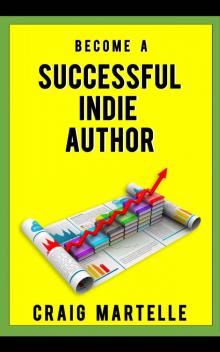 Become a Successful Indie Author
Become a Successful Indie Author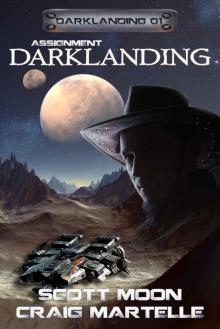 Assignment Darklanding
Assignment Darklanding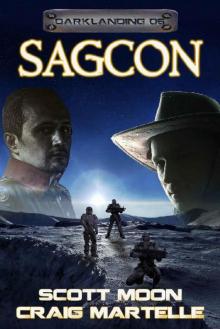 SAGCON
SAGCON Metamorphosis Alpha 2
Metamorphosis Alpha 2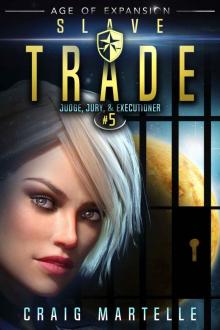 Slave Trade
Slave Trade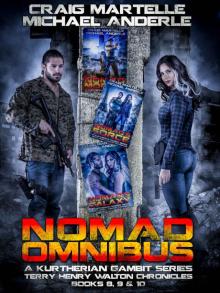 Nomad Omnibus 03: A Kurtherian Gambit Series (A Terry Henry Walton Chronicles Omnibus)
Nomad Omnibus 03: A Kurtherian Gambit Series (A Terry Henry Walton Chronicles Omnibus)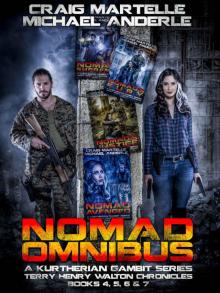 Nomad Omnibus 02: A Kurtherian Gambit Series (A Terry Henry Walton Chronicles Omnibus)
Nomad Omnibus 02: A Kurtherian Gambit Series (A Terry Henry Walton Chronicles Omnibus) Fratricide
Fratricide Judge, Jury, & Executioner Boxed Set
Judge, Jury, & Executioner Boxed Set Serial Killer: A Space Opera Adventure Legal Thriller (Judge, Jury, & Executioner Book 3)
Serial Killer: A Space Opera Adventure Legal Thriller (Judge, Jury, & Executioner Book 3) Destroyer: A Military Space Opera (The Bad Company Book 5)
Destroyer: A Military Space Opera (The Bad Company Book 5) Free Trader Complete Omnibus
Free Trader Complete Omnibus Your Life Is Forfeit: A Space Opera Adventure Legal Thriller (Judge, Jury, & Executioner Book 4)
Your Life Is Forfeit: A Space Opera Adventure Legal Thriller (Judge, Jury, & Executioner Book 4) Dragon Invasion
Dragon Invasion The Expanding Universe
The Expanding Universe Race to the Finish
Race to the Finish Destroyer
Destroyer Discovery
Discovery A Warrior's Home: Assignment Darklanding Book 09
A Warrior's Home: Assignment Darklanding Book 09 Nomad's Journal
Nomad's Journal Blockade: Age of Expansion - A Kurtherian Gambit Series (The Bad Company Book 2)
Blockade: Age of Expansion - A Kurtherian Gambit Series (The Bad Company Book 2) Cygnus Expanding: Humanity Fights for Freedom (Cygnus Space Opera Book 2)
Cygnus Expanding: Humanity Fights for Freedom (Cygnus Space Opera Book 2) Blockade
Blockade Nomad Omnibus 01_A Kurtherian Gambit Series
Nomad Omnibus 01_A Kurtherian Gambit Series Boom Town
Boom Town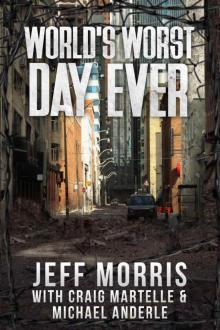 World's Worst Day Ever
World's Worst Day Ever Nomad's Journal_A Kurtherian Gambit Series
Nomad's Journal_A Kurtherian Gambit Series Endure (End Times Alaska Book 1)
Endure (End Times Alaska Book 1) Nomad's Fury: A Kurtherian Gambit Series (Terry Henry Walton Chronicles Book 5)
Nomad's Fury: A Kurtherian Gambit Series (Terry Henry Walton Chronicles Book 5)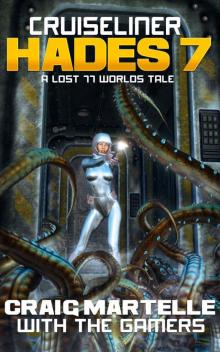 Cruiseliner Hades 7: A Lost 77 Worlds Tale
Cruiseliner Hades 7: A Lost 77 Worlds Tale The Bad Company
The Bad Company Nomad Avenged
Nomad Avenged Fury (End Times Alaska Book 4)
Fury (End Times Alaska Book 4) Nomad Mortis
Nomad Mortis Return to the Traveler (Free Trader Series Book 9)
Return to the Traveler (Free Trader Series Book 9)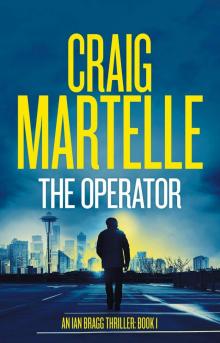 The Operator
The Operator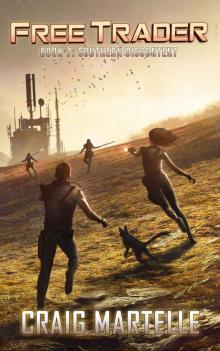 Southern Discontent
Southern Discontent Liberation: Age of Expansion - A Kurtherian Gambit Series (The Bad Company Book 4)
Liberation: Age of Expansion - A Kurtherian Gambit Series (The Bad Company Book 4) You Have Been Judged_A Space Opera Adventure Legal Thriller
You Have Been Judged_A Space Opera Adventure Legal Thriller Nomad's Galaxy
Nomad's Galaxy Nomad's Force: A Kurtherian Gambit Series (Terry Henry Walton Chronicles Book 9)
Nomad's Force: A Kurtherian Gambit Series (Terry Henry Walton Chronicles Book 9) Gateway To The Universe: In Bad Company
Gateway To The Universe: In Bad Company Nomad Supreme: A Kurtherian Gambit Series (Terry Henry Walton Chronicles Book 4)
Nomad Supreme: A Kurtherian Gambit Series (Terry Henry Walton Chronicles Book 4) Nomad Avenged: A Kurtherian Gambit Series (Terry Henry Walton Chronicles Book 7)
Nomad Avenged: A Kurtherian Gambit Series (Terry Henry Walton Chronicles Book 7) Nomad Redeemed: A Kurtherian Gambit Series (Terry Henry Walton Chronicles Book 2)
Nomad Redeemed: A Kurtherian Gambit Series (Terry Henry Walton Chronicles Book 2) You Have Been Judged
You Have Been Judged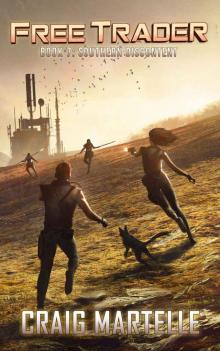 Southern Discontent (Free Trader Series Book 7)
Southern Discontent (Free Trader Series Book 7) Battle for the Amazon (Free Trader Series Book 4)
Battle for the Amazon (Free Trader Series Book 4) Nomad's Galaxy: A Kurtherian Gambit Series (Terry Henry Walton Chronicles Book 10)
Nomad's Galaxy: A Kurtherian Gambit Series (Terry Henry Walton Chronicles Book 10) Nomad's Journal: A Kurtherian Gambit Series (Terry Henry Walton Chronicles)
Nomad's Journal: A Kurtherian Gambit Series (Terry Henry Walton Chronicles)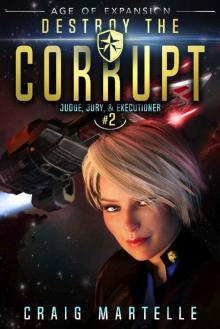 Destroy The Corrupt: A Space Opera Adventure Legal Thriller (Judge, Jury, & Executioner Book 2)
Destroy The Corrupt: A Space Opera Adventure Legal Thriller (Judge, Jury, & Executioner Book 2) The Free Trader of Planet Vii
The Free Trader of Planet Vii Nomad Supreme
Nomad Supreme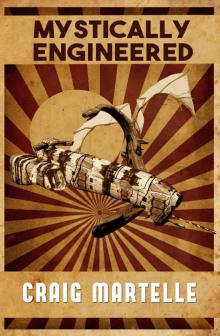 Mystically Engineered
Mystically Engineered Free Trader Box Set - Books 4-6: Battle for the Amazon, Free the North!, Free Trader on the High Seas
Free Trader Box Set - Books 4-6: Battle for the Amazon, Free the North!, Free Trader on the High Seas Nomad Unleashed
Nomad Unleashed Nomad's Force
Nomad's Force The Great Cat Rebellion (Free Trader Series Book 8)
The Great Cat Rebellion (Free Trader Series Book 8) Nomad's Fury
Nomad's Fury Return to the Traveler
Return to the Traveler Nomad's Justice
Nomad's Justice Nomad's Justice: A Kurtherian Gambit Series (Terry Henry Walton Chronicles Book 6)
Nomad's Justice: A Kurtherian Gambit Series (Terry Henry Walton Chronicles Book 6)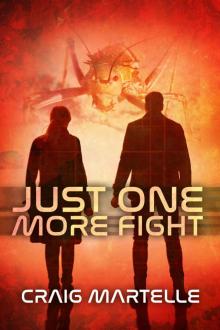 Just One More Fight
Just One More Fight Price of Freedom
Price of Freedom Adventures on RV Traveler (Free Trader Series Book 3)
Adventures on RV Traveler (Free Trader Series Book 3) Nomad Found
Nomad Found Liberation_Age of Expansion_A Kurtherian Gambit Series
Liberation_Age of Expansion_A Kurtherian Gambit Series Nomad Omnibus 01: A Kurtherian Gambit Series (A Terry Henry Walton Chronicles Omnibus)
Nomad Omnibus 01: A Kurtherian Gambit Series (A Terry Henry Walton Chronicles Omnibus) Run (End Times Alaska Book 2)
Run (End Times Alaska Book 2) The Free Trader of Warren Deep (Free Trader Series Book 1)
The Free Trader of Warren Deep (Free Trader Series Book 1) Cygnus Rising: Humanity Returns to Space (Cygnus Space Opera Book 1)
Cygnus Rising: Humanity Returns to Space (Cygnus Space Opera Book 1) You Have Been Judged: A Space Opera Adventure Legal Thriller (Judge, Jury, & Executioner Book 1)
You Have Been Judged: A Space Opera Adventure Legal Thriller (Judge, Jury, & Executioner Book 1) The Expanding Universe 4: Space Adventure, Alien Contact, & Military Science Fiction (Science Fiction Anthology)
The Expanding Universe 4: Space Adventure, Alien Contact, & Military Science Fiction (Science Fiction Anthology) Nomad Unleashed: A Kurtherian Gambit Series (Terry Henry Walton Chronicles Book 3)
Nomad Unleashed: A Kurtherian Gambit Series (Terry Henry Walton Chronicles Book 3) The Great Cat Rebellion
The Great Cat Rebellion Nomad Redeemed
Nomad Redeemed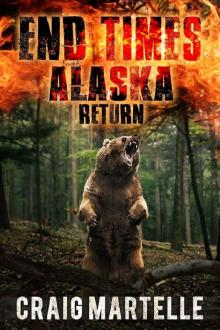 Return (End Times Alaska Book 3)
Return (End Times Alaska Book 3)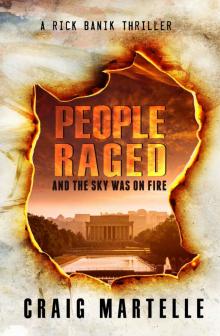 People Raged: and the Sky Was on Fire-Compendium (Rick Banik Thrillers Book 1)
People Raged: and the Sky Was on Fire-Compendium (Rick Banik Thrillers Book 1) Nomad Mortis: A Kurtherian Gambit Series (Terry Henry Walton Chronicles Book 8)
Nomad Mortis: A Kurtherian Gambit Series (Terry Henry Walton Chronicles Book 8) Nomad Found: A Kurtherian Gambit Series (Terry Henry Walton Chronicles Book 1)
Nomad Found: A Kurtherian Gambit Series (Terry Henry Walton Chronicles Book 1) Cygnus Arrives: Humanity Returns Home (Cygnus Space Opera Book 3)
Cygnus Arrives: Humanity Returns Home (Cygnus Space Opera Book 3)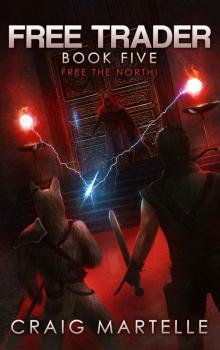 Free the North! (Free Trader Series Book 5)
Free the North! (Free Trader Series Book 5) Price of Freedom: Age of Expansion - A Kurtherian Gambit Series (The Bad Company Book 3)
Price of Freedom: Age of Expansion - A Kurtherian Gambit Series (The Bad Company Book 3)